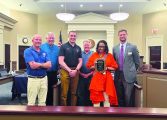By Heather Michon
Correspondent
The debate over redistricting heated up during the Board of Supervisors meeting on Wednesday (Nov. 17).
At a previous meeting, supervisors voted 3-2 to put forth a six-district map for a public hearing on Dec.1.
This map is non-binding; supervisors may ultimately vote on any of the five maps prepared by county staff, or even come up with something different.
However, the discussion over which map to present illustrated the division between board members, some of whom want to stay with five districts, one who would prefer to see seven districts, and two who unexpectedly came out in favor of six districts.
But speakers during the public comment period on Wednesday made it clear: they want to stay at five districts.
Mike Feazel of Lake Monticello read a letter signed by 75 residents, arguing that six districts would lead to tied votes and increased costs to the county for salaries, among other impacts. “In fact, it seems that the only intent in switching to a six-seat system would be to stall county actions,” he said.
“I’m concerned and disappointed that the majority of you voted for Redistricting Map 6,” said Jessica Jackson.
One major issue was that redistricting could potentially redistrict two school board members out of their seats. State law is unclear what would happen to current member James Kelley and newly-elected Gequetta Murray-Key, an African-American. “I really don’t understand how three of you would push a map that may take the only African-American school board member off the board,” she said.
School Board Chair Perrie Johnson said the vote for the six district map had been a “tremendous surprise.” While not commenting on any issues around the school board, she said she supported a five-district map.
Rudy Garcia of the Chamber of Commerce said he had at first supported seven districts, but “I was wrong.” After much discussion with other residents, he had come to believe “seven is a mistake and six is an absolute disaster.”
Among other issues, Garcia said six districts could potentially tarnish the county’s reputation. “Because someone is going to say that this community did that because it didn’t want a Black School Board member. Whether it’s true or not is irrelevant.”
UNFINISHED BUSINESS
Following a full agenda, the discussion over redistricting came back late in the evening and went on for well over an hour.
Chair Mike Sheridan (Columbia) and Vice-Chair Tony O’Brien (Rivanna) had recently attended a meeting of the Virginia Association of Counties, where the complications of redistricting had been on full display.
“Everyone is doing something a little different,” said O’Brien.
The process of redistricting is usually completed in the spring of the year following a census. But COVID-19 lead to a delay in the 2020 Census results, and counties didn’t get the data until September, pushing the process close to the deadline of Dec. 30.
Further complicating the issue, the statewide bipartisan commission tasked with redrawing congressional and legislative maps deadlocked and has now handed the process to the Virginia Supreme Court. Without those maps, counties run the risk of creating split precincts and being sent back to the drawing board sometime next year.
Because the redistricting process is usually completed long before the elections in November, state law is unclear on how localities would fill any newly-created seats or what happens to those elected in one district, only to find themselves suddenly in a new district.
County Attorney Fred Payne urged the supervisors to take “the most literal and conservative interpretation of the statutes as a whole.”
Payne indicated that Cunningham supervisor-elect Chris Fairchild, and possibly Murray-Key, might be protected under safe-harbor laws that allow those elected and seated to boards to maintain their seats even if district lines change during their terms.
Fairchild’s term starts January 1, 2022. Payne said new district maps have to be approved by the Attorney General before they can take effect, and “we’re not going to get approved by Jan. 1.”
O’Brien, who sits on the redistricting committee, said that because the idea of six districts hadn’t been a board priority, the six-distict map hadn’t been given the same consideration as the five- and seven-district map.
“That map should be re-looked at again and if we’re going to seriously consider a six-district map — which I don’t recommend as a board member — if we’re going to do that, we should not be considering that map,” he said. “That is not a good map.”
During the second round of public comments, Jessica Jackson came back to the podium.
“I’ve really been frustrated and disappointed with these last 20 minutes,” she said. “There’s a difference between hearing and listening to the public.”
All the residents who spoke out had called for five districts, she noted, yet the supervisors’ conversations had still focused mainly on six or seven districts. She called the disconnect “patronizing” and disrespectful to the citizens who had stayed for the duration of the lengthy meeting.
“This is not about race,” she said. “It’s about fairness.”
OTHER MATTERS
While redistricting dominated the conversation, the board took action on several other matters:
- Approved a Special Use Permit for a 36-acre solar farm on a 361-acre parcel on Rt. 615 in Carysbrook by a vote of 5-0;
- Approved an ordinance amendment allowing the county to levy and enforce a cigarette tax of $0.02 per cigarette. The seven-county Blue Ridge Cigarette Tax Board will manage the logistics of tax collection, and Fluvanna is projected to result in annual revenues of $200-300,000. The vote was 4-1, with Supervisor Patrica Eager (Palmyra) voting no;
- Approved a budget transfer of $37,000 to Human Resources to pay for a compensation and classification study for county employees by a 5-0 vote;
- Voted 5-0 to join the Virginia Opioid Abatement Fund. The state will receive $530 million in the coming years for the pharmaceutical industry’s $26 billion settlement with the states. Some of this money will be given to localities, although the amounts are not yet clear;
- Deferred an appointment to the James River Water Authority (JRWA). The death of one of the two Fluvanna representatives to the board created an unexpected opening, and Sheridan had offered to assume the seat at a recent meeting. However, Booker said there were some qualified individuals that might be willing to serve. The board voted 4-0 to defer, with Sheridan abstaining.




